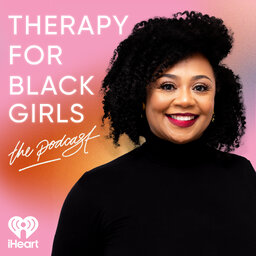Session 385: Diabetes Digital with Wendy & Jess
Many of you in our community are familiar with Wendy and Jess of the Food Heaven podcast, who joined us in 2022 for a conversation about developing a healthy relationship with food. Well, the dynamic duo of BFFs and registered dietician nutritionists are back — this time in honor of National Diabetes Month — to discuss their new platform, Diabetes Digital. Diabetes Digital is an insurance-covered telehealth platform designed to empower individuals to manage and prevent diabetes through 1:1 virtual nutrition counseling. During my conversation with Wendy and Jess, we discuss not just how you might benefit from getting involved with their new platform, but also how to generally manage stress, diet, and lifestyle concerns that may come up after a diabetes or prediabetes diagnosis.
About the Podcast
The Therapy for Black Girls Podcast is a weekly conversation with Dr. Joy Harden Bradford, a licensed Psychologist in Atlanta, Georgia, about all things mental health, personal development, and all the small decisions we can make to become the best possible versions of ourselves.
Resources & Announcements
Grab your copy of Sisterhood Heals.
Where to Find Wendy & Jess
Stay Connected
Is there a topic you'd like covered on the podcast? Submit it at therapyforblackgirls.com/mailbox.
If you're looking for a therapist in your area, check out the directory at https://www.therapyforblackgirls.com/directory.
Take the info from the podcast to the next level by joining us in the Therapy for Black Girls Sister Circle community.therapyforblackgirls.com
Grab your copy of our guided affirmation and other TBG Merch at therapyforblackgirls.com/shop.
The hashtag for the podcast is #TBGinSession.
Make sure to follow us on social media:
Twitter: @therapy4bgirls
Instagram: @therapyforblackgirls
Facebook: @therapyforblackgirls
Our Production Team
Executive Producers: Dennison Bradford & Maya Cole Howard
Senior Producer: Ellice Ellis
Producer: Tyree Rush
Associate Producer: Zariah Taylor
In 1 playlist(s)
Therapy for Black Girls
The Therapy for Black Girls podcast is a weekly conversation with Dr. Joy Harden Bradford, a license…Social links
Follow podcast
Recent clips

Session 453: What Speech-Language Pathologists Actually Do?
47:17

Session 452: Is Having a Boyfriend Embarrassing Now? Romance, Identity & Online Culture
51:20

Session 451: Student Loan Forgiveness & Reclassifying Degrees
48:49
 Therapy for Black Girls
Therapy for Black Girls